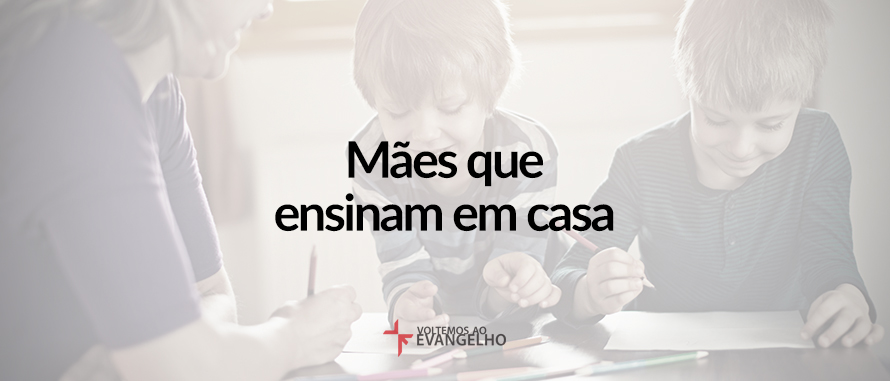Mother, have you ever considered teaching your children outside of a traditional school?
We invited Sabrina Gardner, wife of Daniel, mother of Arthur and Thomas, to tell us about their experience of home education.
- It is not new that the education system promoted in Brazil is not working well.
- Today the Law on Guiding Principles and Fundamentals of Education requires children to enroll in the regular school system at age 4.
- However.
- As children and young people spend more and more time in school.
- We are seeing a frightening drop in education levels in Brazil each year.
- PISA 2015 (International Student Assessment Program) ranks Brazil 63rd out of 70 participating countries.
- In science.
- 82% of students were below Level 2 learning.
- Considered the minimum needed to become one?criticism?y.
Faced with this desperate situation, the Christian father has a duty to be intentional in the education of his children, for some, this means following his children’s school routine very closely, completing schooling at home and trying to repair the damage caused to the school environment. Other parents actively seek to participate in teacher meetings, while others seek to enroll their children in denominational schools, in the midst of which, parents who opt for home education, also known as home education, have gained followers in Brazil in recent years.
Home education is nothing more than an educational modality where teaching takes place outside of a formal educational institution, under the responsibility of parents and family, and subject to many variations related to methodology, teaching materials, routine, content sequence, activities, evaluation, etc.
While this is a relatively new issue for us, it is already a common practice in many other countries. According to the National Institute of Home Education Research (NHERI), in the United States, about 2. 2 million students are proficient in this type of education. In Brazil, the 2016 Aned (National Association of Home Education) survey indicates that around 6,000 Brazilian children already receive home education.
I am married to Daniel (son of missionaries who attended primary and secondary school at home with his four siblings) and two years ago we decided to follow this path with our children (Arthur, 3 and Thomas, 1 year). Since then, we have been researching the topic and method that would suit our family. My husband was brought up in a traditional way, similar to the school routine. With our children, we will follow a classical Christian education. And this is one of the beauties of homeschooling, the personalization of teaching for each reality, each family, each student, in order to contemplate and deepen interests, establish appropriate routines and with excellent performance. I am a teacher in early childhood education, and in school it is very difficult to offer this personalized attention, content and formats adapted to the type of learning of each student, which often generates a lack of interest in studies and little content learned, in fact. In homeschooling, this possibility is greatly expanded, of course with effort. I would say that I have no advantage in having a formal education and that hard working parents are very capable of providing quality education at home. Note that it is not necessary to have all the contents of the books or to remember all the math formulas by heart. We must be a few steps ahead of our children and continue together to rebuild their own education. It is very important to spend time finding good books and planning.
There are those who discuss the illegality of home education in Brazil, and it should be noted that, as it is a relatively new issue, our laws do not mention it The Legal Advisory Council of the Chamber of Deputies issued an opinion declaring that home education is constitutional and, on 22 November 2016, Minister Roberto Barroso published an excerpt that suspended the progress of all processes related to the education of families , until the topic was discussed by the STF.
Learn more about the legal status of home education in our country at this link in the Famolia de Trigo blog.
In Brazil, the school at home is still in diapers, Portuguese literature on the subject is beginning to appear, communities begin to form and families have helped each other on this path. As educational challenges arise, can God give parents the wisdom to lead?education? and the lives of our children. There is no magic formula that solves all pedagogical challenges, but we must keep in mind that no matter what kind of education we can offer, the Lord our God is the primary object of directing all our energy and the source of all knowledge. As parents, we must intervene for this education to glorify it. With God’s grace, let us seek to become more intentionally involved in the teaching of our children.
BIO: Sabrina Gardner graduated in pedagogy from the Faculdade Batista in Sao Paulo, with an extension in hospital pedagogy from the PUC in Sao Paulo. Married to Daniel Gardner and the educated mother at Arthur and Thomas’ school. Written for trigo Famolia’s blog
By: Sabrina S. Gardner. © Return to the Gospel. Website: voltemosaoevangelho. com. Translated with permission. Source: Mothers who teach at home © Faithful Ministérium. Website: MinisterioFiel. com. br. All rights reserved.

